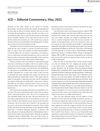 May 2021 in “The FASEB Journal”
May 2021 in “The FASEB Journal” The research gives new understanding on how human steroid 5α-reductases work and how drugs like finasteride inhibit them, which could help in creating new drugs.
 April 2021 in “Journal of Cosmetic Dermatology”
April 2021 in “Journal of Cosmetic Dermatology” The May 2021 issue of the Journal of Cosmetic Dermatology suggests injectables are becoming more reliable and may reduce the need for cosmetic surgery.
 489 citations,
November 2021 in “Signal Transduction and Targeted Therapy”
489 citations,
November 2021 in “Signal Transduction and Targeted Therapy” The JAK/STAT pathway is important in cell processes and disease, and JAK inhibitors are promising for treating related conditions.
[object Object]  5 citations,
October 2022 in “Heliyon”
5 citations,
October 2022 in “Heliyon” Polycystic ovary syndrome, a disorder causing menstrual issues and infertility, can be treated with lifestyle changes, medication, herbal remedies, surgery, and assisted reproductive techniques like artificial insemination and IVF.

The conference emphasized innovative solutions for global challenges, including disaster architecture, education, health, and economic impacts.
 January 2021 in “Middle East journal of applied sciences”
January 2021 in “Middle East journal of applied sciences” Zinc is essential for plant growth and human health, but many soils lack enough zinc, affecting crops and potentially leading to health problems.
 September 2020 in “British Journal of Dermatology”
September 2020 in “British Journal of Dermatology” The document highlights advancements and findings in dermatology, including AI use, disease prevention, treatment efficacy, and the impact of conditions on patients' lives.
 May 2022 in “Rossijskij žurnal kožnyh i veneričeskih boleznej”
May 2022 in “Rossijskij žurnal kožnyh i veneričeskih boleznej” Alopecia areata is complex, often recurring, and needs personalized treatment, especially with other health issues.
 3 citations,
August 2022 in “Curēus”
3 citations,
August 2022 in “Curēus” The SARS-CoV-2 vaccine may be linked to triggering autoimmune conditions like Alopecia Areata.
 3 citations,
May 2022 in “JAAD case reports”
3 citations,
May 2022 in “JAAD case reports” A woman developed alopecia after her second Pfizer vaccine but regrew her hair with treatment and had no issues after a booster shot.
 January 2024 in “American journal of clinical dermatology”
January 2024 in “American journal of clinical dermatology” Ritlecitinib is safe and well-tolerated for treating alopecia areata in patients aged 12 and older.
 13 citations,
April 2023 in “Nature communications”
13 citations,
April 2023 in “Nature communications” Long COVID patients have more health issues than non-infected people.
 February 2024 in “Curēus”
February 2024 in “Curēus” Long COVID is more common in those with severe initial infections, but not linked to blood group.
 April 2022 in “Research Square (Research Square)”
April 2022 in “Research Square (Research Square)” Long COVID recovery is hindered by smoking, with hair loss being a difficult symptom to treat.
 2 citations,
September 2022 in “Scholarly journal of otolaryngology”
2 citations,
September 2022 in “Scholarly journal of otolaryngology” Epipharyngeal Abrasive Therapy helps reduce symptoms in Long COVID patients with chronic epipharyngitis.
 2 citations,
March 2023 in “BioScience Trends”
2 citations,
March 2023 in “BioScience Trends” The review indicates that understanding of long COVID symptoms is still limited and better research is needed for diagnosis and treatment.
4 citations,
May 2022 in “Medicina” Kampo medicine can help treat general fatigue from long COVID.
 1 citations,
June 2021 in “Cureus”
1 citations,
June 2021 in “Cureus” A girl with hereditary chorea, likely Huntington's disease, had her condition worsened by lupus.
 2 citations,
June 2022 in “Scientific reports”
2 citations,
June 2022 in “Scientific reports” Women with PCOS have higher hair cortisol levels, which are linked to worse metabolic and inflammatory conditions.
 September 2022 in “Research Square (Research Square)”
September 2022 in “Research Square (Research Square)” Caffeic acid helps protect rats from the harmful effects of acrylamide.

Hepatitis B vaccination can trigger HSP, and vitamin D correction and tonsillectomy can effectively manage it.
[object Object]  3 citations,
July 2022 in “Dermatologic Therapy”
3 citations,
July 2022 in “Dermatologic Therapy” Magnesium microneedle patches can safely improve under-eye wrinkles when used every other night for 12 weeks.
 September 2023 in “Dermatology and Therapy”
September 2023 in “Dermatology and Therapy” Baricitinib effectively regrows hair in most people with severe alopecia, especially those with patchy hair loss, but hair may fall out again if treatment stops.
 1 citations,
July 2022 in “International Journal of Environmental Research and Public Health”
1 citations,
July 2022 in “International Journal of Environmental Research and Public Health” In Poland, people search more for certain skin conditions depending on the season, and despite more STD infections, searches for them have decreased, suggesting a need for better sexual education.
 77 citations,
March 2004 in “Human Reproduction”
77 citations,
March 2004 in “Human Reproduction” Women with irregular periods and/or excessive body hair are more likely to have polycystic ovaries, and this condition is linked to higher health risks.
2 citations,
January 2021 in “Clinical dermatology review” Modified PRP therapy successfully treated severe alopecia unresponsive to traditional methods.
January 2019 in “Journal of Dermatology and Dermatologic Surgery” Wearing headcovers doesn't affect male-pattern hair loss severity.
 16 citations,
September 2020 in “British journal of dermatology/British journal of dermatology, Supplement”
16 citations,
September 2020 in “British journal of dermatology/British journal of dermatology, Supplement” The article suggests that targeting specific immune pathways could help control and treat the skin disease hidradenitis suppurativa.
 April 2021 in “Journal of Investigative Dermatology”
April 2021 in “Journal of Investigative Dermatology” Transgender patients on hormone therapy experience more acne and hair loss, but less skin inflammation.
 March 2023 in “Seminars in reproductive medicine”
March 2023 in “Seminars in reproductive medicine” PCOS often leads to sleep problems, especially obstructive sleep apnea, affecting overall health.


























